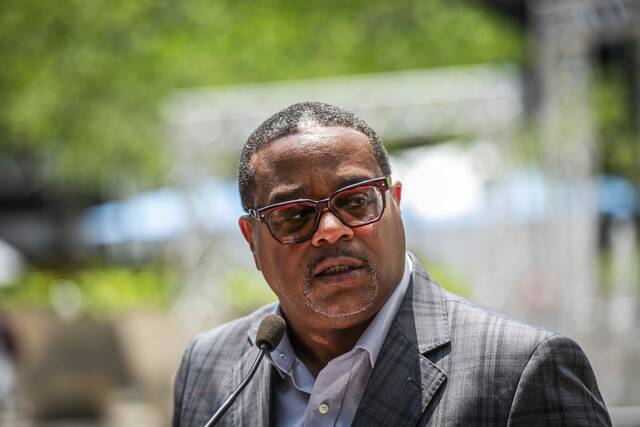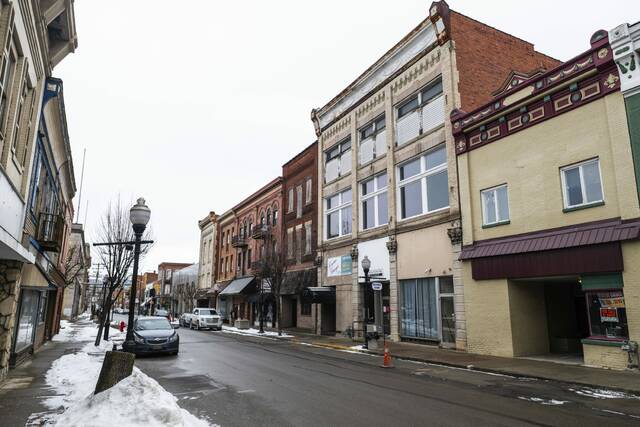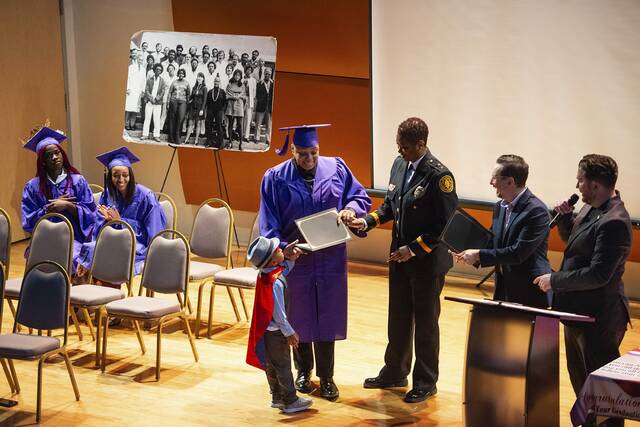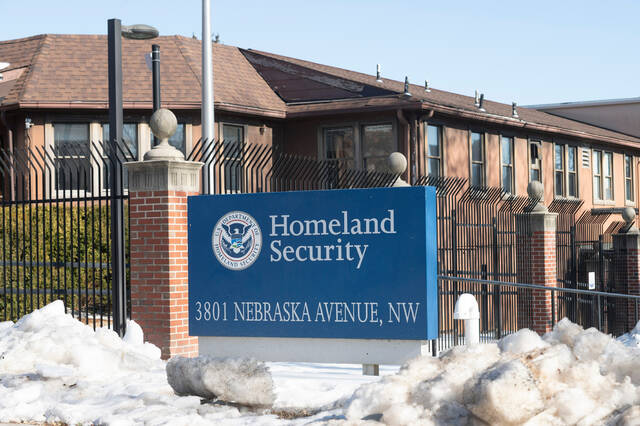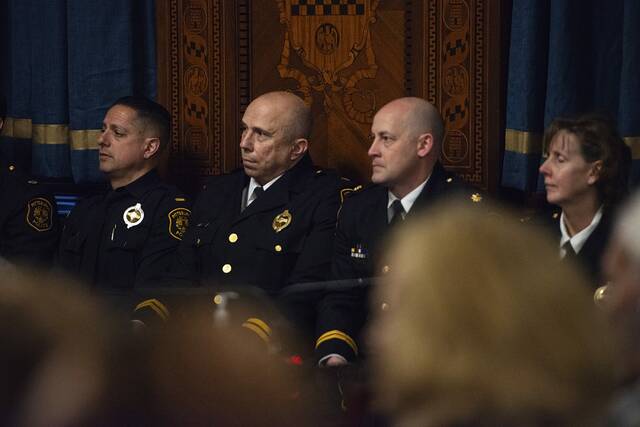Pittsburgh’s controller and several City Council members on Wednesday skewered parts of Mayor Ed Gainey’s budget proposal for next year, with one councilman calling it “unprofessional” and “sloppy.”
The $680 million operating budget — released Tuesday evening after a last-minute rush to make final adjustments — avoids tax hikes and layoffs but boosts spending by 2.2% in response to rising costs.
Controller Rachael Heisler said there are “glaring omissions” that don’t properly account for enough firefighters or for proper investment in the city’s aging vehicle fleet. She called the budget “simply not an honest document.”
“The numbers may add up on paper, but they do not reflect the reality of the city’s pending costs,” Heisler said. “The bottom line is that this proposal does not tell the truth about the City’s basic operating expenses.”
Heisler noted the mayor’s spending plan budgets for 679 firefighters — although current staffing is 700.
The controller also raised concerns that the capital budget includes about $25 million for new vehicles over five years — far short of the $20 million investment officials have said the city should spend each year on its snowplows, fire trucks, ambulances and other vehicles.
Councilman Anthony Coghill, D-Beechview, said the city should be budgeting millions more in overtime.
Coghill, who chairs council’s public safety committee, said he was particularly concerned that public safety overtime expenses could balloon next year when the city hosts the NFL Draft in April.
A funding and cooperation agreement city officials signed leaves Pittsburgh responsible for covering “all costs related to deploying City police, fire and emergency/medical services, street closure activities, police escort services, tactical support units, and command centers required for NFL Draft events.”
“To say we have the money for it is ridiculous,” Coghill said. “It doesn’t add up to me at all. Their budget is not going to add up.”
Heisler echoed the councilman’s concerns, reiterating past warnings about the city’s overtime spending for public safety personnel.
The 2026 budget would leave projected police overtime at $15 million, the same amount budgeted this year. Last year, police spent about $20 million on premium pay.
The fire bureau would get an extra $1 million for overtime in Gainey’s budget, up to $17.5 million — but short of its nearly $22 million expenditure last year.
Budgeted EMS overtime, meanwhile, is set to jump to nearly $6 million from $3.6 million, but still less than the $7 million-plus spent in 2024.
“Overtime is a symptom of staffing, poor management,” Heisler said. “We remain worried about staffing.”
Jake Pawlak, Pittsburgh’s director of the Office of Management and Budget, said city officials considered a tax hike but determined they could “close the gap” without it.
The city is facing financial strains as federal covid-19 relief money dries up, property tax revenue continues to drop and the Pennsylvania Supreme Court barred the city from collecting the facility usage fee, a 3% tax on out-of-town professional athletes and performers.
Pawlak said the city trimmed 50 vacant job positions and about $3 million in non-personnel operating expenses.
Accounting for inflation
Among other concerns, Heisler noted the revenue for deed transfer tax included in the preliminary budget do not match the figures the controller’s office certified.
The 2025 deed transfer estimate Heisler certified is over $39 million. In Gainey’s budget, the number is about $27 million.
Pawlak said officials may need to “correct a typo.”
Pittsburgh’s Chief Financial Officer Parick Cornell told reporters officials would look into the discrepancy and update the document if needed.
Olga George, a spokeswoman for the mayor, said an updated budget document would go online to correct the revenue projections and other “formatting issues.”
When asked about public safety overtime for the draft, Pawlak said the administration was “not concerned.”
“I would say it’s relatively minimal in an operating sense,” Pawlak said.
An extra $300,000 in the Department of Public Works overtime budget is designated for draft-related needs, Pawlak said. Some paving and signal improvement projects also are associated with the event.
The budget does not anticipate any revenue increases from the draft either, he said.
“We don’t, as a matter of course, incorporate large one-time events into our revenue forecast,” Pawlak said.
The budget leaves the police bureau’s staffing at 800.
The Gainey administration previously dropped the budgeted headcount for police officers to 850 from 900, then to 800, reflecting the city’s difficulties in recruiting enough officers to meet those thresholds.
Pawlak said the city now is “within striking distance” of 800, even as the bureau this year saw its staffing levels drop to their lowest numbers in two decades.
‘Bubblegum on a leak’
The Gainey administration drafted a $100 million capital budget for next year, which pays for things like infrastructure projects, long-term investments and vehicles.
That’s a 17% cut from this year’s $121 million capital spending plan.
“Some of that is a result not of an overall reduction in spending but moving the timelines,” Pawlak said, explaining some projects have been pushed to future years.
The budget also had to be scaled back because of reduced federal funding.
Gainey’s top budget officials said they’re proposing an increase in vehicle spending next year to $10 million, which would for the first time divert revenues from the state’s liquid fuels tax.
Liquid fuel tax money typically pays for salaries in the Department of Public Works, Cornell said.
“It’s not nearly enough to fill the hole we’re in,” Coghill said. “It’s like putting a piece of bubblegum on a leak in a dam. But that’ll help.”
The budget includes money for six new ambulances, a bucket truck, refuse and recycling trucks, pickups, dump trucks and street sweeper leases.
Councilman Bob Charland, D-South Side, a vocal Gainey critic said he felt the budget needed more money for demolitions, vehicles and paving.
Mayor’s office
Charland pointed out that the budget plan trims the mayor’s office staff to 16 full-time employees from 39, reducing its budget by about $3 million.
“The budget looks like it was crafted to spite the next mayor and not crafted with the best interests of Pittsburgh in mind,” Charland said.
Gainey lost the Democratic primary to Allegheny County Controller Corey O’Connor, who will face Republican Tony Moreno, a former city police officer, in the general election.
Gainey is tasked with crafting the 2026 budget, which City Council must adopt by the end of the year, before his successor takes office.
The proposed budget does not include pay raises for the mayor and chief of staff.
George, the Gainey spokeswoman, attributed the problem to a “data transfer error.”
Pawlak said the administration intended for those positions to see 3% pay bumps, like all other non-union workers.
Coghill said it was “unprofessional, sloppy” to release a budget with errors.
Pawlak said some of the positions being trimmed from the mayor’s office are not being eliminated entirely, just moved to other departments.
Personnel managing the city’s non-emergency 311 help line, for example, are shifting to the Office of Management and Budget.
“We reduced the operating expenditures for the mayor’s office to about where they were in the 2021 budget,” Pawlak said, referring to the year before Gainey took office. “We reset it basically to the level it had historically been at.”
Several members of the communications team were moved out of the mayor’s office to other departments.
Pawlak acknowledged critics have often complained of extra spending and staffing in the mayor’s office under Gainey’s tenure.
Other positions throughout the budget that have been empty were cut altogether, including some civilian roles in the police bureau and an executive assistant in the Office of Management and Budget.
Pawlak said they did not eliminate any filled positions that would result in layoffs but did get rid of some new positions the Gainey administration had created — but not filled — in recent years.
In 2021, before Gainey took office, the city had 3,390 full-time workers. By 2024, that number jumped to more than 3,600.
Coghill unhappy with capital budget
The budget plans for a $500,000 allocation for the city’s land bank in 2027. Pawlak said the land bank in 2026 would rely on the last of its federal covid-19 relief money.
Some officials have raised concerns that prior spending plans didn’t fund the land bank beyond the expiration of that federal aid, which must be spent by the end of next year.
Pawlak acknowledged the city is in a tight financial position. The biggest challenge, he said, is the declining real estate tax revenue. He called for regular property reassessments, which could help stabilize property taxes.
Pawlak said he believes “we’ve passed the crest of the curve” on reassessments for Downtown buildings that have lost value since the pandemic drove a shift to remote work.
Bus passes and playgrounds
Councilwoman Barb Warwick, D-Greenfield, said she was excited by some of the initiatives set to receive money next year.
She mentioned city plans to buy bulk bus Pittsburgh Regional Transit passes for its employees who work Downtown.
The measure, Warwick said, is “a really good example the city is setting for other employers in the area.”
She pointed to a nearly $2 million investment in bike lanes and paths through Schenley Park, which she described as “much needed.”
Also included is $634,000 to improve Lewis Park.
“That’s a playground in Hazelwood that has been long neglected for many, many years,” Warwick said. “That is a perfect use of the park tax.”
But Coghill lambasted Gainey’s capital spending plan, which includes no projects in his district — which includes Beechview, Brookline, Carrick, Bon Air and Overbrook — next year. It is the only district not slated to see a single capital project.
The councilman had requested $200,000 next year to relocate pickleball courts, basketball courts, a playground and spray features in Brookline’s Moore Park. That was not funded.
Neither was a $250,000 request to improve safety surfaces and play equipment at Brookline Memorial Playground, which is in such bad condition that Coghill is mulling having the playground closed until it can be fixed.
“How this is not in the budget is beyond me,” Coghill said, adding the projects represent small asks in the context of a $100 million capital plan. “This is the difference of kids using the park or not.”
The capital budget includes over $89.5 million through 2031 for a controversial public safety training facility to be built in Lincoln-Lemington.


